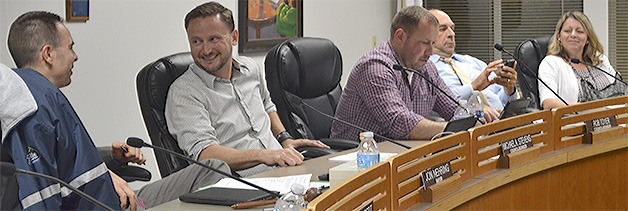MARYSVILLE – City Council members said overall that their system is working fine, but then debated for about an hour how it might be fixed at their meeting April 11.
“If it ain’t broke, don’t fix it,” Council Member Donna Wright said.
But then Council President Kamille Norton said the board should have more say about what is discussed at meetings.
Board Member Jeff Vaughan agreed. “The intent of the council is not always represented” on the agenda,” he said.
ADVERTISEMENT
0 seconds of 0 secondsVolume 0%
Press shift question mark to access a list of keyboard shortcuts
Keyboard Shortcuts
Shortcuts Open/Close/ or ?
Play/PauseSPACE
Increase Volume↑
Decrease Volume↓
Seek Forward→
Seek Backward←
Captions On/Offc
Fullscreen/Exit Fullscreenf
Mute/Unmutem
Decrease Caption Size-
Increase Caption Size+ or =
Seek %0-9
Mayor Jon Nehring said city staff puts together the agenda, but “council can drive an agenda item” by making staff aware of it.
Chief Administrative Officer Gloria Hirashima said the agenda is driven by department needs.
Wright said, “In ancient days we used to see it” before meetings.
Vaughan said he would like to see the agenda earlier so he can “see what’s coming up and contemplate,” especially on controversial issues.
Councilman Jeff Siebert said he would like to see a more formal process so the board can get items on the agenda. With more time, the lawmakers would be better prepared to ask questions of staff.
Hirashima said the city could come up with a form that would be copied to the other council members.
Walker cautioned them not to exchange ideas on that form, that it would be for information only, because of open records laws.
Vaughan also mentioned that any solution should not slow down the process.
Vaughan also brought up that the city needs to have a short- and long-term planning session of goals, adding the council got away from that during the economic downturn.
Nehring said that was a great idea, and Hirashima said city staff is looking at a two-day retreat soon.
“There’s a great need for a brain-storming session,” Nehring said.
Another topic of discussion was ethics and if the council could remove another member for violations.
Walker said that would be up to voters, via a recall.
Norton brought up if there even is an ethics board, and no one seemed to know the answer.
A question was brought up if the board could admonish members for actions, but Wright changed the topic to what would happen if a board member could not serve, if they became incapacitated for some reason.
Vaughan said that has happened in the past, and it is extremely “difficult when faced with that.”
Currently, the board can excuse a member, but Council Member Michael Stevens asked how long should that be allowed?
Norton asked about committee assignments.
Siebert said historically there was council turnover every two years so new assignments had to be made.
Vaughan added that some assignments are better than others, and lawmakers like to hang on to them, but “we don’t have to wait two years.”
The council also debated how formal it wants to be, as it doesn’t completely follow Roberts Rules of Order.
“It goes pretty well without that,” Vaughan said. “But there have been some slip-ups.”
He gave examples of members talking out of order, and changing topics when members had more to say.
Nehring said, “Some pretty robust training would be required.”
Vaughan said he doesn’t want to see things become that rigid.
“But it helps so the chair doesn’t have to be a referee,” he said.



